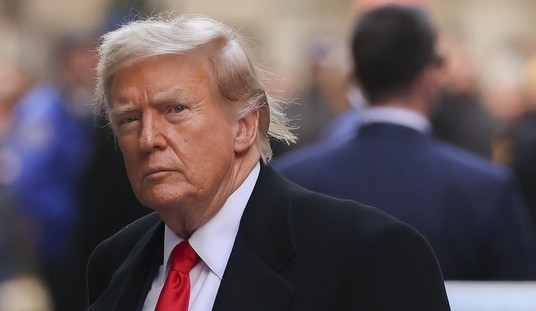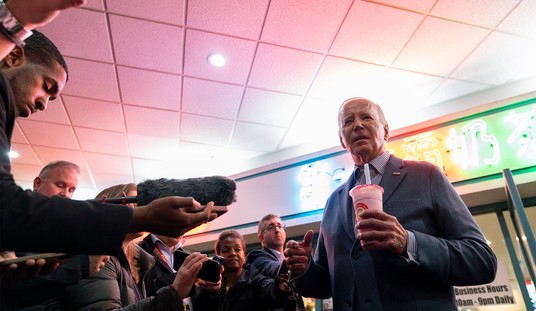It’s rare that a picture-perfect example of classical logic theory happens in real life. But this morning we were treated to an illustration of a logical paradox straight out of textbook.
As many articles noted last night, the world is on tenterhooks anticipating when the Supreme Court will make its ObamaCare ruling, but the Supreme Court always insists that its decisions come out unexpectedly, which is why they work in secret:
Television cameras will surround the Supreme Court on Thursday morning, as they did Monday, anticipating something that may, again, not happen.
The momentous healthcare decision could be announced Thursday. Or not. All we really know is that it is extremely likely to be handed down by the following Thursday, June 28, when the court is expected to end its current term.
The court works in secrecy as it prepares its opinions, and outsiders might be surprised to learn that some of its work is done at the last minute. …
Only a few times in modern history have the results leaked ahead of time, once reputedly from a comment by a justice to a reporter, another time from a talkative printer.
The court is not meeting Friday, so if the healthcare decision does not come Thursday, the next opportunity would be Monday.
Next week the tension will intensify. If the healthcare decision is not announced before the 28th, that day is likely to be wild: It would be the first time reporters and the public would go to court knowing they would witness what could be one of the most significant constitutional rulings of the century.
This is the best-ever real-world example of one of logic theory’s most notorious paradoxes, variously dubbed The Unexpected Exam Paradox, the Prediction Paradox, or the Unexpected Hanging Paradox.
The example given on wikipedia runs like this:
A judge tells a condemned prisoner that he will be hanged at noon on one weekday in the following week but that the execution will be a surprise to the prisoner. He will not know the day of the hanging until the executioner knocks on his cell door at noon that day.
Having reflected on his sentence, the prisoner draws the conclusion that he will escape from the hanging. His reasoning is in several parts. He begins by concluding that the “surprise hanging” can’t be on Friday, as if he hasn’t been hanged by Thursday, there is only one day left – and so it won’t be a surprise if he’s hanged on Friday. Since the judge’s sentence stipulated that the hanging would be a surprise to him, he concludes it cannot occur on Friday.
He then reasons that the surprise hanging cannot be on Thursday either, because Friday has already been eliminated and if he hasn’t been hanged by Wednesday night, the hanging must occur on Thursday, making a Thursday hanging not a surprise either. By similar reasoning he concludes that the hanging can also not occur on Wednesday, Tuesday or Monday. Joyfully he retires to his cell confident that the hanging will not occur at all.
The next week, the executioner knocks on the prisoner’s door at noon on Friday — which, despite all the above, was an utter surprise to him. Everything the judge said came true.
The variant I’m most familiar with is “The Unexpected Quiz,” in which a logic professor tells his class of 30 students on April 1 that there will be an unexpected pop quiz one day that month, but the students won’t know which day, so they need to study hard and be ready at all times, because they don’t want to be caught unprepared.
After the professor leaves the room, the stupidest student in the class stands up and reasons thus:
“He’ll purposely delay the quiz until the last day, so we have to spend all month studying.”
But then the second-stupidest student gets a sudden idea, and stands up to say,
“If, as you predict, the quiz is secretly scheduled for April 30, then when it isn’t given on or before the 29th we’ll know for sure that the quiz must be given on the next day, so we’ll all be expecting it; but the professor already said that it will be an ‘unexpected’ quiz, Q.E.D. we can rule out the 30th — it’s logically impossible for an unexpected quiz to be given on the last day. Therefore I expect it on the 29th.”
But then the third-stupidest student stands up and says,
“That may be true, but if the 30th is absolutely ruled out by the rules of logic, that means that the last day the quiz can possibly be given is the 29th; yet if it isn’t given by the end of the 28th, then we’ll be anticipating it on the 29th, which once again means it won’t be unexpected. Thus, the 29th is ruled out as well. I therefore think it will be on the 28th.”
The fourth-stupidest student then gets a flash of inspiration, stands up and says,
“But if the 29th is also ruled out…” and goes through the same reasoning to eliminate the 28th.
And so the students progress through the days of the month, eliminating each one of them in turn, until everyone at last turns to the smartest student, who instead of paying attention to their discussion is furiously studying his textbook. “Don’t you understand, you fools?” he says. “We’ve already eliminated April 2 through April 30. Therefore, the only conclusion is that the unexpected quiz will be today!!”
Panicked, the students all start studying as well. But when the professor returns he does not give the quiz that day. Nor the following day. Each night, the students study, but April 30 rolls around and still no quiz. A minute before the final bell rings on April 30, the professor stands up and says, to everyone’s utter astonishment, “Congratulations: You all passed the quiz! Your task was to figure out that according to the rules of logic, it is impossible for this quiz to be unexpected. Since each one of you expected the quiz on a different day, you put me in a paradox from which there was no escape. Bravo!”
The Unexpected Hanging Paradox has a different resolution than the Unexpected Quiz Paradox, because there is only one prisoner to be hanged and at the start of the process he individually can only expect the hanging on one particular day; but the class in the quiz paradox can operate as a Group Mind, and spread out the “expectation field” to every possible day.
The Supreme Court is now facing the same paradox. As noted in the L.A. Times article (among many others), the justices never announce ahead of time which day they will release any decision — it has to come unexpectedly. But we know they’ll issue a ruling before the end of June, so if it hasn’t arrived by the second-to-last business day of the month, then the entire nation will be camped out in front of the Supreme Court building on the only remaining possible day for the decision to be handed down. Since the justices want to avoid this at all costs, they’re almost certain to avoid June 28, which is the last day of their term. But as the article notes, each preceding day will therefore in turn be the day on which everyone expects the ruling, so the justices are trapped in a logical paradox: Their decision can’t be unexpected. This is why all the networks rushed down to the Supreme Court this morning, expecting (as did the smartest student in the Unexpected Quiz example) that it simply had to be today.
But it wasn’t.
And so every day the court is in session from now until June 28, the same problem will play out, and the justices will be logically cornered by their own announced rules of behavior.
The only possible conclusion is that they never release their ObamaCare decision, because that’s the only way that their actions could remain “unexpected.”
But now we encounter the final problem: I just expected the non-decision, eliminating that possibility as well.
This is why it’s called a paradox: there is no solution. The rules of logic break down.
What will happen next? Will America itself simply wink out of existence, unable to maintain its presence in a universe governed by logic?








Join the conversation as a VIP Member